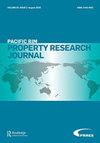Determinants of job satisfaction of real estate firms’ employees in Nigeria
IF 0.3
Q3 Economics, Econometrics and Finance
引用次数: 0
Abstract
ABSTRACT The study investigated the job satisfaction levels of real estate firms’ employees and the relationship between employees’ personal and demographic characteristics and their job satisfaction levels. This is intending to provide information that could enhance better job performance and enhance human resource management in the real estate industry. Data employed for the study was sourced using a close-ended questionnaire administered on private real estate firms’ employees in the Lagos property market. Data were analyzed using both descriptive and inferential statistical techniques. The result showed that financial consideration/personal accomplishment was the most important factor influencing employees’ level of satisfaction, followed by work environment skill variety/organizational culture, feedback/fairness, work passion and supervision/workload/work-life balance. Also, the analysis showed that demographic factors with significant relationships with job satisfaction include age, marital status, academic qualification, management level, years spent under the current line manager, remuneration and number of firm branches. Thus, given the increasing investors’ attention towards investments in emerging property markets, and the need to satisfy clients’ increasing sophistication and dynamism, private real estate firms are encouraged to prioritize issues relating to remunerations and workers welfare thereby ensuring an increased level of employees’ satisfaction, enhanced job performance and increased firms’ productivity.尼日利亚房地产公司员工工作满意度的决定因素
摘要本研究调查了房地产企业员工的工作满意度水平,以及员工的个人特征和人口统计学特征与工作满意度水平的关系。这是为了提供信息,可以提高更好的工作绩效和加强人力资源管理的房地产行业。研究中使用的数据来自于对拉各斯房地产市场的私人房地产公司员工进行的封闭式问卷调查。数据分析使用描述性和推断性统计技术。结果显示,财务考虑/个人成就是影响员工满意度的最重要因素,其次是工作环境技能多样性/组织文化、反馈/公平、工作热情和监督/工作量/工作与生活平衡。此外,分析显示,与工作满意度有显著关系的人口因素包括年龄、婚姻状况、学历、管理水平、在现任直线经理手下工作的年限、薪酬和公司分支机构数量。因此,鉴于投资者越来越关注新兴房地产市场的投资,以及满足客户日益成熟和活力的需要,鼓励私营房地产公司优先考虑与薪酬和工人福利有关的问题,从而确保提高员工满意度,提高工作绩效和提高公司生产力。
本文章由计算机程序翻译,如有差异,请以英文原文为准。
求助全文
约1分钟内获得全文
求助全文

 求助内容:
求助内容: 应助结果提醒方式:
应助结果提醒方式:


